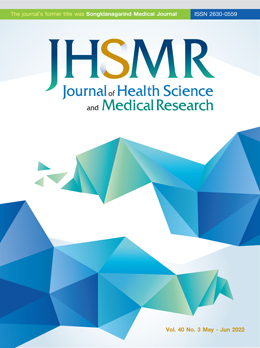Genetic Analysis of Children with Dravet Syndrome in a Resourcelimited Setting
DOI:
https://doi.org/10.31584/jhsmr.2021838Keywords:
Dravet syndrome, SCN1A, PCDH19, Thai children, Sanger sequencingAbstract
Objective: To identify the common causal gene mutations in Thai children with the Dravet (DS) phenotype, using single gene analysis.
Material and Methods: The study was carried out on 20 DS patients at Siriraj Hospital, Bangkok, Thailand. Sanger sequencing of the Voltage-Gated Sodium Channel Alpha Subunit 1 (SCN1A) gene was conducted in all patients. In SCN1A-negative patients, multiplex ligation-dependent probe amplification of the SCN1A gene was performed in all cases; however, direct sequencing of the Protocadherin-19 (PCDH19) gene was analyzed in girls only.
Results: Fourteen (70.0%) DS patients were found to carry pathogenic SCN1A mutations, with 6 novel mutations. In SCN1A-negative patients; 1 of the 4 girl patients (25.0%) had a novel PCDH19 mutation, while none of the 6 patients had a large deletion or duplication in the SCN1A gene.
Conclusion: The SCN1A gene is the most common causative mutation in Thai children with DS phenotype. This study emphasizes the benefit of Sanger sequencing of the SCN1A gene in resource-limited countries to aid in making appropriate therapeutic decisions.
References
Akiyama M, Kobayashi K, Ohtsuka Y. Dravet syndrome: a genetic epileptic disorder. Acta Med Okayama 2012;66:369-76.
Dravet C. The core Dravet syndrome phenotype. Epilepsia 2011;52(Suppl 2):3-9.
Xu X, Zhang Y, Sun H, Liu X, Yang X, Xiong H, et al. Early clinical features and diagnosis of Dravet syndrome in 138 Chinese patients with SCN1A mutations. Brain Dev 2014;36: 676-81.
Moreno de Flagge N. Simple febrile seizure, complex seizure, generalized epilepsy with febrile seizure plus, FIRES and new syndromes. Medicina (B Aires) 2013;73(Suppl 1):S63-70.
Berkovic SF, Harkin L, McMahon JM, Pelekanos JT, Zuberi SM, Wirrell EC, et al. De-novo mutations of the sodium channel gene SCN1A in alleged vaccine encephalopathy: a retrospective study. Lancet Neurol 2006;5:488-92.
Guerrini R, Dravet C, Genton P, Belmonte A, Kaminska A, Dulac O. Lamotrigine and seizure aggravation in severe myoclonic epilepsy. Epilepsia 1998;39:508-12.
Depienne C, Trouillard O, Saint-Martin C, Gourfinkel-An I, Bouteiller D, Carpentier W, et al. Spectrum of SCN1A gene mutations associated with Dravet syndrome: analysis of 333 patients. J Med Genet 2009;46:183-91.
Claes L, Del-Favero J, Ceulemans B, Lagae L, Van Broeckhoven C, De Jonghe P. De novo mutations in the sodium-channel gene SCN1A cause severe myoclonic epilepsy of infancy. Am J Hum Genet 2001;68:1327-32.
Marini C, Scheffer IE, Nabbout R, Mei D, Cox K, Dibbens LM, et al. SCN1A duplications and deletions detected in Dravet syndrome: implications for molecular diagnosis. Epilepsia 2009;50:1670-8.
Depienne C, Bouteiller D, Keren B, Cheuret E, Poirier K, Trouillard O, et al. Sporadic infantile epileptic encephalopathy caused by mutations in PCDH19 resembles Dravet syndrome but mainly affects females. PLoS Genet 2009;5:e1000381.
Shi X, Huang MC, Ishii A, Yoshida S, Okada M, Morita K, et al. Mutational analysis of GABRG2 in a Japanese cohort with childhood epilepsies. J Hum Genet 2010;55:375-8.
Patino GA, Claes LR, Lopez-Santiago LF, Slat EA, Dondeti RS, Chen C, et al. A functional null mutation of SCN1B in a patient with Dravet syndrome. J Neurosci 2009;29:10764-78.
Shi X, Yasumoto S, Kurahashi H, Nakagawa E, Fukasawa T, Uchiya S, et al. Clinical spectrum of SCN2A mutations. Brain Dev 2012;34:541-5.
Yu FH, Mantegazza M, Westenbroek RE, Robbins CA, Kalume F, Burton KA, et al. Reduced sodium current in GABAergic interneurons in a mouse model of severe myoclonic epilepsy in infancy. Nat Neurosci 2006;9:1142-9.
Li J, Shi L, Zhang K, Zhang Y, Hu S, Zhao T, et al. VarCards: an integrated genetic and clinical database for coding variants in the human genome. Nucleic Acids Res 2018;46:D1039-D48.
Kopanos C, Tsiolkas V, Kouris A, Chapple CE, Albarca Aguilera M, Meyer R, et al. VarSome: the human genomic variant search engine. Bioinformatics 2019;35:1978-80.
Richards S, Aziz N, Bale S, Bick D, Das S, Gastier-Foster J, et al. Standards and guidelines for the interpretation of sequence variants: a joint consensus recommendation of the American College of Medical Genetics and Genomics and the Association for Molecular Pathology. Genet Med 2015; 17:405-24.
Minardi R, Licchetta L, Baroni MC, Pippucci T, Stipa C, Mostacci B, et al. Whole-exome sequencing in adult patients with developmental and epileptic encephalopathy: It is never too late. Clin Genet 2020;98:477-85.
Hattori J, Ouchida M, Ono J, Miyake S, Maniwa S, Mimaki N, et al. A screening test for the prediction of Dravet syndrome before one year of age. Epilepsia 2008;49:626-33.
Oguni H, Hayashi K, Awaya Y, Fukuyama Y, Osawa M. Severe myoclonic epilepsy in infants--a review based on the Tokyo Women's Medical University series of 84 cases. Brain Dev 2001;23:736-48.
Lee HF, Chi CS, Tsai CR, Chen CH, Wang CC. Electroencephalographic features of patients with SCN1A-positive Dravet syndrome. Brain Dev 2015;37:599-611.
Caraballo RH, Fejerman N. Dravet syndrome: a study of 53 patients. Epilepsy Res 2006;70(Suppl 1):S231-8.
Striano P, Mancardi MM, Biancheri R, Madia F, Gennaro E, Paravidino R, et al. Brain MRI findings in severe myoclonic epilepsy in infancy and genotype-phenotype correlations. Epilepsia 2007;48:1092-6.
Downloads
Published
How to Cite
Issue
Section
License

This work is licensed under a Creative Commons Attribution-NonCommercial-NoDerivatives 4.0 International License.
























